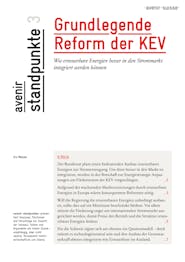The Swiss government’s energy strategy envisages a significant extension of the role of renewables in electricity generation. Accordingly, its draft legislation includes adjustments to the current system of subsidies encouraging renewables (the Kostendeckende Einspeisevergütung or KEV).But this is too timid a step in the right direction. The background of growing distortions in the market and the declining value of renewables on electricity trading markets means bolder reforms are necessary.The third of Avenir Suisse’s “avenir standpunkte” studies shows how renewbles can be better integrated into the power market. It offers decision makers short and easily understandable analyses, positions and suggestions. What, for example, are the weaknesses in the current regime to boost renewables? What are the alternatives?
If Switzerland wants to back renewables more strongly, subsidies should be kept to a minimum as the domestic potential is too limited and the costs too high. But above all, any future support should be more market based, so future prices can steer the structure and operations of renewable energy sources. Most suitable for Switzerland would be a quota model. This would oblige electricity utilities to cover part of their sales via renewables. At the same time, the model should be “technology neutral”, allowing the integration of large scale hyrdo-electric schemes alongside renewables from abroad.





